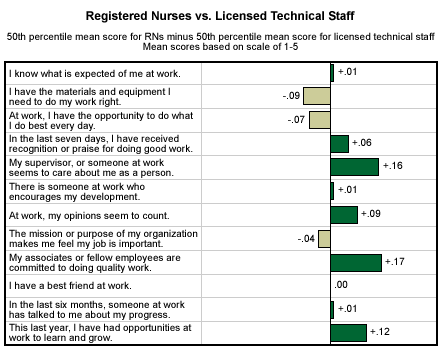Third in a three-part series on engagement levels among hospital employees
Registered nurses and licensed technical staff members are important to patient care, yet they tend to score lower than other hospital employees in employee engagement.
RNs and licensed technical staff encounter many of the same challenges, and Â鶹´«Ã½AV's hospital employee engagement database shows they also share low scores on several of the items in Â鶹´«Ã½AV's Q12 employee engagement survey. Relative to other hospital staff members, RNs and licensed technical staff members both give below-average ratings on three of the survey's 12 items:
- I have the materials and equipment I need to do my job right.
- In the last seven days, I have received recognition or praise for doing good work.
- At work, my opinions seem to count.
Comparing Registered Nurses to Licensed Technical Staff
Despite these points of common discontent, RNs and licensed technical staff do tend to score most of the survey's items somewhat differently. When comparing the 50th percentile scores of RNs to the 50th percentile scores of licensed professional staff, RNs score above licensed technical staff on 8 of the 12 items, and licensed technical staff score above RNs on 3. The areas of concern for each group reveal some of the unique challenges that RNs and licensed technical staff members face.

RN Areas of Concern
RNs score below licensed technical staff on three items:
- I have the materials and equipment I need to do my work right.
- At work, I have the opportunity to do what I do best every day.
- The mission or purpose of my organization makes me feel my job is important.
The "materials and equipment" item is an area of concern for both groups, but particularly for RNs. Low scores on this item stem from a lack of needed supplies, staff shortages, and ineffective processes (see "Nurturing Hospital Employee Engagement: Registered Nurses" in Related Items).
Nurses also feel they are prevented from doing what they do best, which may reflect an increase in time-consuming, non-patient-care activities that nurses are forced to perform because of reductions in the number of care assistants and unit secretaries. If RNs are delivering food trays, answering unit phone calls, or filling out copious amounts of paperwork, they have less time to monitor IVs.
The same issues that lead to low RN scores on the "materials and equipment" and "do what I do best" items may also contribute to low scores on the "mission" item. All manner of equipment and personnel shortages may give nurses the feeling that they are less able to fulfill their primary mission as nurses -- to care for patients.
Licensed Technical Staff Concerns
Licensed technical staff score below RNs on 8 of the 12 items, but the three items with the biggest gaps are:
- My associates or fellow employees are committed to doing quality work.
- My supervisor, or someone at work, seems to care about me as a person.
- This last year, I have had opportunities at work to learn and grow.
Licensed technical staff members seem to view themselves as invisible members of the patient care team. They don't feel other staff members care about them and they don't feel their associates are committed to doing quality work. To top that off, they don't feel they are going anywhere professionally.
Bottom Line
In many cases, RNs are in danger of losing their sense of institutional commitment to the mission of providing patient care, and feeling that they aren't personally contributing to this mission by doing what they do best. Hospitals need to make this link more explicit when developing long-term strategic plans. For every action they plan, administrators must ask, "How does this contribute to our mission?" When communicating strategic changes and activities to the nursing staff, hospitals should explain how each change relates to mission. Administrators also need to look for creative ways to help RNs devote more time to doing what they do best -- provide hands-on patient care. For example, perhaps patient transport staff could help with tray passing.
For licensed technical staff, the key is visibility. Employees in this group need to feel like other members of the staff, especially RNs, really see them and value their contributions. To help foster these feelings, hospitals might try scheduling joint department education sessions for both RNs and licensed technical staff members. RNs and licensed technical staff members should be encouraged to recognize each other for doing good work. This will help instill a sense of mission that's broad enough to encompass all the members of the patient care team, so that RNs and licensed technical staff will not be tempted to form separate "silos" that breed negativity.
The Q12 items are protected by copyright of The Â鶹´«Ã½AV Organization, Princeton, NJ, 1992-1999. All rights reserved.
